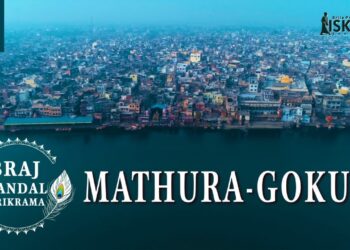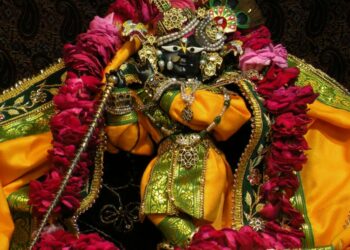The Legend of Jagannath, Puri is an English documentary aired on Nat Geo. Rajeev Khandelwal takes us to Puri, Odisha to watch the famous Rath Yatra of Lord Jagannath, Lord Balabhadra and Devi Subhadra. With him explore the magnificent architecture of the Jagannath Temple and learn how this yatra brings diverse cultures, faiths and mythology together.
Jagannath Rath Yatra at Puri involving moving the deities of Jagannath, Balabhadra and Subhadra to the Gundicha temple, three kilometres away, for a period of seven days. The National Geographic Channel will air tonight an hour-long documentary The Legend of Jagannath showcasing this yatra while bringing to fore the legends and stories connected with the Jagannath temple (one of the char dhams sacred to Hindus), the gods housed in it and the devotional fervour of the faithful.
The narrator, Rajiv Khandelwal, a self-declared atheist says, the film helped him understand the faith the people have, their fear of god and beliefs. “Seeing people coming from across the world on a hot and humid day, chanting, dancing, playing instruments and swaying, awaiting for a mere glimpse of the deities and touching the chariot is an amazing experience in itself.” He is right because you can see and feel the deep sense of devotion among the men and women, cutting across all barriers, in their eyes and gestures. Describing himself as an explorer, Rajiv plays the part to the hilt, displaying eagerness to learn while taking the journey of discovery forward.
The journey featured in the film is special as it depicts the custom of replacing of old idols of the deities with new ones –– nabakalebra (new body) –– after 19 years, the very first this millennium. It conveys the message that death is inevitable, says Paramahamsa Prajnanananda, Master Kriya Yoga. “We live with pride, arrogance and stubbornness but here the Lord is saying, ‘I came and I am going. Get ready!’”
What makes the documentary interesting is Rajiv showcasing behind-the-scene preparations while providing analysis of unique aspects and nuggets of information. Craftsmen who build the three chariots by shaping the wheels, axle and upper structure and carving intricate motifs rely on handspans for measurement and oral knowledge received from forefathers. Similarly the right of first service to yatra –– sweeping the floor of the chariot –– is vested in the King of Puri. Gajapati Maharaja Dubyasingha Deb, the present king says, “It symbolises that before the Lord there is nothing high or low and even the smallest of our acts should be dedicated at his feet.” Likewise, we gather that the sudarshana atop the temple is not just symbolic but protects the structure from lighting.
Nicely woven into film is the legend and history connected with how the god worshipped by tribes became Lord Jagannath (lord of the Universe). Tracing the efforts of a central India king Indradymna in making the tribal god, Nila Madhava, a public deity, this story is shown in pictures making it distinct.
Mythologist and author Devdutt Pattanaik’s insightful explanations make the proceedings interesting. Observing that Lord Jagannath belongs to the Vaishnavite tradition, he says, “This deity celebrates life and lives like a king. Getting up in the morning, bathing, wearing different clothes, he is served food.” Believed to visit Puri for lunch, the god is served an array of food items prepared from indigenous ingredients. That is how one of the biggest kitchens in the world came into being. Using 1000 earthen pots just once, 600 cooks prepare 56 dishes on wood-fired traditional stoves which after offering to the god, is distributed as mahaprasad. What is noteworthy is that even though the quantity of food remains the same, there is neither shortage nor wastage irrespective of the number of devotees.
The documentary presents a larger than life spectacle in all its colour, customs and culture while emphasising how faith can endure what body cannot.


















